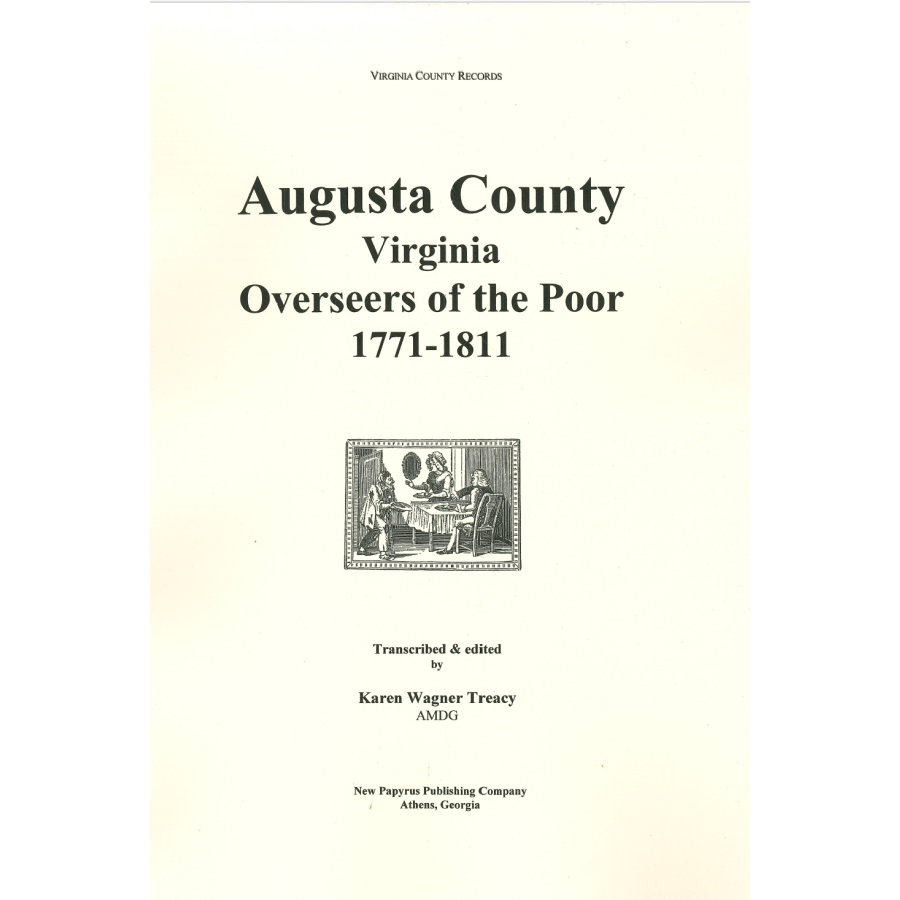Augusta County, Virginia Overseers of the Poor, 1770-1811
Couldn't load pickup availability
From the author's Introduction: The well-to-do population of Augusta County, Virginia in the Shenandoah Valley, is well documented as well. We have deeds, wills, court cases, and inventories of their estates. There is considerably less of that for those with less assets and resources. Poor people are nearly invisible in the public record. This volume, Overseers of the Poor Records, Augusta County Virginia, 1770-1811, and its two companions aim at shedding some light on those overlooked citizens of the Valley.
The Library of Virginia houses some of the Augusta County (Va.) Court Records, 1769-1837, Local government records collection. A finding aid in the Library's catalog describes the contents of this collection. It consists of
- Box 1 Barcode number 1050895: Overseer of the Poor Records, 1769-1802
- Box 2 Barcode number 1050898: Overseer of the Poor Records, 1803-1811
- Box 3 Barcode number 1050920: Overseer of the Poor Records, 1812-1837
- Box 4 Barcode number 1204934: Various Series, 1799-1833. Bonds/Commissions/Oaths (1803), Miscellaneous Records (1803), Tax and Fiscal Records (1771-1833), and Wills (1799)
This present book contains the transcription of boxes one and two. I examined but did not transcribe box three; those interested in the later activities of the overseers are urged to begin there. For earlier records, my Vestry Book of Augusta Parish, 1742-1782 contains much information. Box four above of the court records also contains items of interest, especially the many lists of delinquent or insolvent titheables (the "tax and fiscal records') which were addressed to the overseers. Those, with additions from the Virginia State Auditors records, are published as my Delinquent Tithables, Augusta County Virginia, 1771-1817.
Overseer of the Poor Records comprise the majority of this collection. These are loose papers documenting the work of the overseers of the poor in caring for the impoverished citizens of Augusta county. Records for the corporation of Staunton are intermingled with the county papers, as well as a variety of other documents. Unaccountably, several records relating to Sheriff Jeremiah McKay of Shenandoah County were included. I omitted transcribing several of them which had no bearing on the overseers of the poor. I also omitted some records too fragmentary to provide information, and summarized many of the (often long) itemized lists of groceries, supplies, legal services, and medical aid provided; including whatever names I could decipher. Spelling and punctuation are as given, except that I have capitalized proper names and names of months and days of the week. My comments or suggested identifications are given in square brackets. As for organization, at length I decided on a chronological arrangement, based on the latest date given in the document.
The two boxes of loose records contain thousands of slips of paper dating from 1770 on. Handwriting is variable, often illegible or faded. I transcribed what I could read, which was pretty inadequate in a lot of cases, but I have included even my guesses here for whatever help they may be. Many slips are undated and I had to guess at their chronological placement by context. Some are duplicates; I included a few when they gave alternate information. In main, they fall into the following categories:
- Bastards: bastardy cases, indexed by name of mother when known
- Binding Children: records of indentures of children
- Burials
- Church and Glebe: matters internal to the parish or church officials
- Court cases: publication notices, fines
- Other Counties
- Overseers: individual overseers identified as such
- Petitions and Letters
- Poor (identified): individuals identified as receiving public assistance
- Poor Rates: summaries by deputies of money collected and distributed.
Karen Wagner Treacy
2023, paper, index, 293 pp.
107-ACOP
